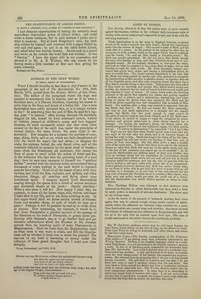The Clairvoyance of Alexis Didier
I Had frequent opportunities of testing the certainly most marvellous clairvoyant power of Alexis Didier, and could relate a dozen instances, but in such matters I prefer not to trust to memory. But at Lord Houghton’s once, his lordship retired by himself and returned with a paper folded up over and over again; he put it on the table before Alexis, and asked what was written therein. Alexis took up a pencil and wrote on the outside the word that was written. It was “Danton.” I have the paper still in my possession, and showed it to Mr. A. R. Wallace, who was struck by his having made a little mistake at first and then giving the name correctly.
Boulogne-Sur-Mer, France.
Animals in the Next World
What I should describe as less than a chefd1oeuvre is the paragraph at the end of The Spiritualist, No. 292, 29th March, 1878, quoted from the Mission Mirror of San Francisco. The author of the paragraph wants his dogs and canaries to accompany him to heaven, just as if he were a Scythian hero, or a Pawnee chieftain, requiring his horses to serve him in the frays and hunts of a better life. Can a true Spiritualist have really invented this, or is it simply written in fun? In admitting that the soul of Mrs. So-and-So’s lapdog goes “to heaven,” after having through life faithfully wagged its tail, kissed its kind mistress’s mouth, barked at visitors, jumped at children’s noses, and torn beggars’ trousers, we must necessarily admit also that every other animal on the face of the earth has, under the principles of eternal justice, the same future, the same right to immortality. Now imagine for a moment the myriads of oxen, pigs, sheep, fowls, and so on, which are daily slaughtered all over the world for man’s use and abuse; or imagine the crabs, the shrimps boiled, the eels flayed alive, and all the torments inflicted on animals by the most cruel of beasts—man—from the Strasbourg pie merchant, who causes the liver of geese to swell under the action of thirst and fire, to the vivisector who lays bare the quivering heart of a poor dog; then let each man represent to himself the “spiritual realms” crowded with the spiritual cattle, accumulated during thousands of years, waiting in the next world to reproach man for his cruelty. Think of all the beasts of prey with their victims, and of all the flies, and ants, and spiders, and other obnoxious things, all crawling and flying about your bewildered spirit. I imagine myself Lord Beaconsfield soaring through the spaces with a crowd of serious monkeys and converted sharks at his heels! Similia similibus! What a nice place it will be! How happy I shall feel, for example, to meet all the hares, stags, roes, wolves, and bears I have shot in my life, and to see them scowling at me. In that upper world shall we hover amidst crowds of ethereal boars and seraphic sheep, of each of which we may eat a piece? Perhaps it will be possible by-and-by to evoke them at seances. How interesting, for example, it would be to hear from Bucephalus a genuine account of the passage of the Granicus or the sack of Persepolis, to gossip about predictions with Balaam’s ass, or to go further back and get valuable informations about the Miocene or the Jurassic periods from the hovering spirit of some Plesiosaurus or Megalosaurus. Shall we learn from the Megatherium itself on what trees it was wont to climb, and will the Dinotherium tell us whether it lived over or under the ground? The can-can in my head is becoming so strong under the influence of these grand thoughts that I must now close abruptly.
Vevey, Switzerland, April 30th, 1878.
<Untitled> (Hymns for the Multitude)
God bless the squire and his relations, |
From pride that will not bend with awe, |
Aided by Spirits
The Evening Standard of May 6th makes some ex parte remarks against Spiritualism, written in the ordinary daily newspaper style of dealing with serious subjects and responsible people, and closes with the following statement:—
While Spiritualism is on the wane in England, however, as hinted above, in St. Louis a convert has been found, though his experiences make him the reverse of happy. The convert’s name is Heth, and his trade that of a grocer. In the pursuit of his calling the other day, he was going to write a letter, when on the paper before him he suddenly read the words, “Go and see Mrs. Smith in Franklin-street.” Mr. Heth was greatly astonished. He did not know Mrs. Smith, though the name was familiar to him, and then Franklin-street was of considerable length. He felt inclined, therefore, to disregard the order, and took up what he supposed to be a clean sheet of paper, but on this likewise he read the same words. Mr. Heth thereupon became convinced that spirits were about, and having a Spiritualistic friend he went to consult him. The friend warmly acquiesced in the idea that Mr. Heth was being guided by spirits, and even professed to recognise the handwriting as that peculiar to ghostly circles; so together they set off for Franklin-street, and after some inquiries found that there was a Mrs. Smith actually living in that street. Calling upon her they asked if they could do anything, and though Mrs. Smith looked strong and healthy, she declared that she had not tasted food for several weeks, and was urgently in want of money. Of course, being under the directing influence of the spirits they supplied her wants, and getting together a medium and a cabinet, and a tambourine, musical-box, and other things to amuse the spirits when they appeared, Mr. Heth and his friend set about inquiring who had dispatched him in search of Mrs. Smith. The medium, after a time, was enabled to announce that the late Smith had done it. He had not known Mr. Heth personally, and why he had made application to a stranger did not exactly appear, but Smith, who was good enough to come round—in the spirit of course—said he was much obliged, and if Mr. Heth came to his sphere he should be happy to repay the obligation by intro- ductions and general endeavours to make things cheerful for a stranger. On leaving the medium’s house, the friend asked the bewildered grocer if he did not feel sublimely happy, but Heth said he did not. “I believe in Spiritualism,” he remarked, “but I don’t like it. Don’t you see that from what Smith’s ghost says a man does not lose sight of his wife after his death, and is in constant danger of having her come to him. Smith has fought the thing off for this time. He has stopped his wife just as she was starting to find him, and, of course, he feels very happy. But this affair gives a man a painful view of the spirit land. It shows that there is no rest for the married. Sooner or later Mrs. Heth will meet me in the spirit world, and yet, in the face of this certainty, you expect me to be cheerful.” In St. Louis the Spiritualists are making much of their new brother, who lives in constant dread lest his reputation for benevolence should spread among spirits whose wives are not well off, and lest he should therefore spend his substance and run the risk of quarrels with his wife by having to call upon ladies with whom she is not acquainted. Heth’s partner, however, declares that Heth was rather drunk when he sat down to write, that he got hold of a sheet of paper with an old direction to a shopman on it, and that it was only natural for two long rows of houses like Franklin-street to contain a Mrs. Smith, who, being poor and artful, would get what she could out of a visitor. But the Spiritualists only deride Heth’s partner as being in outer darkness.
Mrs. Hardinge Britten once informed us that instances were numerous in America in which Spiritualists had been aided a little by spirit power, in moments of extreme destitution. The above may be one of those cases.
As for the horror of the prospect of husbands meeting their wives again, that may be natural enough among people outside of Spiritualism, where the affections are bartered away, crucified for a price. True Spiritualists are exempt from such troubles; they know too well the iniquity of subjugating true affections to things material, and will not go to the altar with an untruth upon their lips. The class of people mentioned in the article deserve the retribution set forth.
<Untitled> (Mr. W. Eglinton, medium, writes)
Mr. W. Eglinton, medium, writes that he will leave London for Cape Town, South Africa, on the 11th of July, by the Balmoral Castle From Cape Town he will go to Australia and other places, and return by the Suez Canal route.
Miraculous Cures.—The London correspondent of The Folkestone News writes:—“I am getting more than ordinarily interested in my Weekly Register. Written in the English language, edited by a cultivated Englishman, it is yet presenting to its English readers a miracle a week. In fact, it is becoming more remarkable for wonderful tales than The Spiritualist. Last week it had the story of a wonderful cure, This week it has another. A sick girl demands to be taken to Lourdes amid the loud ‘blasphemies’ of her family, who regarded her priest-ridden. She silenced them by proposing that if she got well they should become converted. The girl went to Lourdes, and was able, I do not know how soon, to send a message stating that she was cured. She came back to Paris, and all her family had been to confession, and were ready to attend mass with her. The Weekly Register makes this its most conspicuous announcement. In these days it is interesting to notice that simple faith in wonders still exists. I am not quite certain whether that is recorded as a remark, but Louise Lateau wept when she heard that the Pope had an ecstatic fit, and then was calm.”
Editor's notes
- ↑ The Clairvoyance of Alexis Didier by Atkinson, Henry G., London Spiritualist, No. 298, May 10, 1878, p. 222
- ↑ Animals in the Next World by Prince of Wittgenstein, Emile, London Spiritualist, No. 298, May 10, 1878, p. 222
- ↑ Hymns for the Multitude by unknown author, London Spiritualist, No. 298, May 10, 1878, p. 222
- ↑ Aided by Spirits by unknown author, London Spiritualist, No. 298, May 10, 1878, p. 222
- ↑ Mr. W. Eglinton, medium, writes by unknown author, London Spiritualist, No. 298, May 10, 1878, p. 222
Sources
-
London Spiritualist, No. 298, May 10, 1878, p. 222


